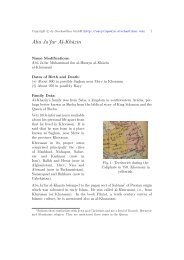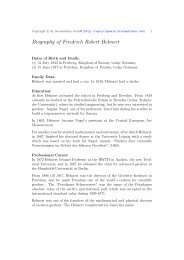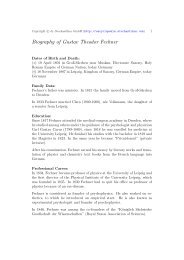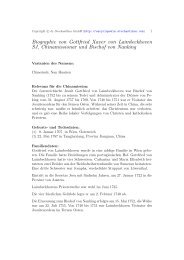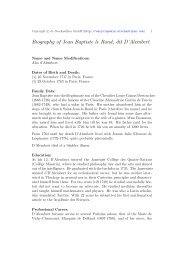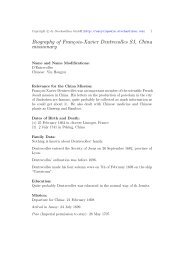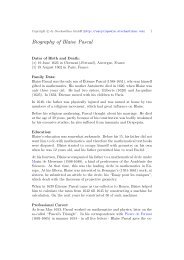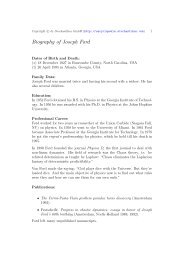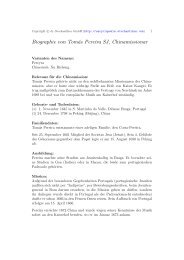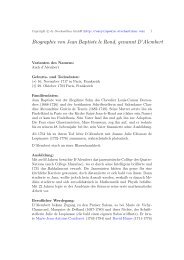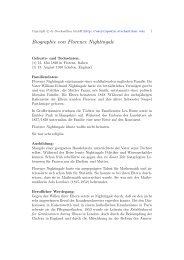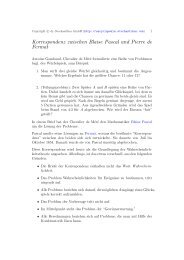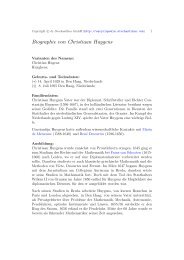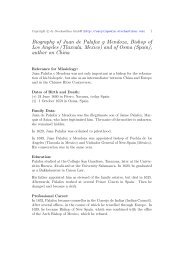Biography of Cornelius Jansen
Biography of Cornelius Jansen
Biography of Cornelius Jansen
Create successful ePaper yourself
Turn your PDF publications into a flip-book with our unique Google optimized e-Paper software.
Copyright c○ by Stochastikon GmbH (http://encyclopedia.stochastikon.com) 1<br />
<strong>Biography</strong> <strong>of</strong> <strong>Cornelius</strong> <strong>Jansen</strong><br />
Name and Name Modifications:<br />
<strong>Jansen</strong>s<br />
<strong>Jansen</strong>ius<br />
Dates <strong>of</strong> Birth and Death:<br />
(∗) 28 October 1585 in Akkoy (Acquoi) nearby Leerdam, Netherlands<br />
(†) 6 May 1638 in Ypern, today Belgium<br />
Family Data:<br />
<strong>Jansen</strong> was born into a Catholic family in the Northern Netherlands.<br />
<strong>Jansen</strong> was a Catholic priest.<br />
Education:<br />
Nothing is known about <strong>Jansen</strong>’s early education. Since 1602 he studied<br />
philosophy at the University <strong>of</strong> Leuven (Löwen), where two kinds <strong>of</strong> theology<br />
were taught, namely an extreme Augustinism and a more “progressive”<br />
theology influenced by Aristotelism and Humanism, its representatives being<br />
Michel Bajus (1513-1589) and Leonhard Lessius (1554-1623) SJ, both <strong>of</strong><br />
whom were both condemned. In 1604 <strong>Jansen</strong> went together with his friend<br />
Jean-Ambroise Duvergier (Jean Du Vergier de Hauranne) (1581-1643) to<br />
Paris, where they continued their studies.<br />
Pr<strong>of</strong>essional Career:<br />
In 1611 <strong>Jansen</strong> and Duvergier moved to Camp-de-Pratz nearby Bayonne,<br />
where <strong>Jansen</strong> directed the newly founded College from 1612 to 1614. From<br />
1614 till 1617 both studied the scriptures <strong>of</strong> the Church Fathers, especially<br />
Aurelius Augustinus (354-430) to start a reform <strong>of</strong> the Catholic dogmatics<br />
and morals. In 1624, <strong>Jansen</strong> took over the headship <strong>of</strong> the Dutch College S.<br />
Pulcheria. In 1618 <strong>Jansen</strong> became Pr<strong>of</strong>essor <strong>of</strong> theology. During 1624-1626<br />
<strong>Jansen</strong> was in Madrid, where he tried to counteract the Jesuits’ influence<br />
at the University <strong>of</strong> Leuven, for they had started a University <strong>of</strong> their own<br />
there. In 1630, <strong>Jansen</strong> became pr<strong>of</strong>essor for Exegesis in Leuven, in 1636 the<br />
Spanish King Philip IV appointed him for bishop <strong>of</strong> Ypern.<br />
<strong>Jansen</strong> taught a rigorous Augustinism. The human’s free will played only a<br />
subordinate role, whereas the human redemption was dependent from Divine
Copyright c○ by Stochastikon GmbH (http://encyclopedia.stochastikon.com) 2<br />
grace only and already fixed in God’s providence (predestination). Therefore<br />
<strong>Jansen</strong> was an advocate <strong>of</strong> a strict pessimism that most humans were already<br />
condemned by God because they all had tended to the evil.<br />
<strong>Jansen</strong> especially fought the Jesuits in Leuven and elsewhere. He was also<br />
an adversary <strong>of</strong> the Calvinists, in spite <strong>of</strong> the fact that his doctrine came<br />
close to Calvinism (but besides that for <strong>Jansen</strong> as a Catholic the doctrine <strong>of</strong><br />
the Catholic Church was valid). In politics <strong>Jansen</strong> fought for a Flemish state<br />
free from Spanish rule.<br />
<strong>Jansen</strong> had much influence by his writings, which made him the founder <strong>of</strong><br />
<strong>Jansen</strong>ism. Especially his Augustinus, started in 1628 and published posthumously<br />
in 3 volumes by his friends led to a quarrel <strong>of</strong> one hundred years.<br />
The book was condemned by Urban VIII (Bull “In eminenti” <strong>of</strong> 1642) and<br />
by Innocent X (Bull “Cum occasione” <strong>of</strong> 1653). <strong>Jansen</strong>ism was in connection<br />
with Gallicanism, i.e. with the claims <strong>of</strong> the French crown against the<br />
Catholic Church, which was continued by Antoine Arnauld (1612-1694) and<br />
Pasquier Quesnel (1634-1719) and in 1700 it had its climax.<br />
France was especially a stronghold <strong>of</strong> <strong>Jansen</strong>ism since 1650, with Antoine Arnauld<br />
and Blaise Pascal (1623-1662), but also with the cloister Port-Royal;<br />
it was pulled down in 1710. The quarrel between the rigorous <strong>Jansen</strong>ism<br />
and the more moderate Probabilism/Laxism <strong>of</strong> the Jesuits led to the condemnations<br />
<strong>of</strong> both sides by Papal Bulls, but ended with the victory <strong>of</strong> the<br />
<strong>Jansen</strong>ists: the method <strong>of</strong> accommodation <strong>of</strong> the Jesuits in China was prohibited,<br />
the Society <strong>of</strong> Jesus was abolished in 1773.<br />
<strong>Jansen</strong>ism was in many respect close to Calvinism, and also influenced by<br />
René Descartes (1596-1650). The sensual rituals and features <strong>of</strong> Catholicism<br />
were refused in favor <strong>of</strong> a certain rigorism.<br />
Publications:<br />
• Augustinus seu doctrina S. Augustini de humanæ naturæ sanitate, ægritudine,<br />
medicina adversus Pelagianos et Massilienses, 3 vols. (Leuven<br />
1640, Paris 1641, reprint Frankfurt 1964), t. 1: In quo hæreses &<br />
mores Pelagij contra naturæ humanæ sanitatem, ægritudinem & medicinam<br />
ex S. Augustino recensentur ac refutantur; t. 2: In quo genuina<br />
sententia S. Avgvstini de humanæ naturæ stantis, lapsæ, puræ status<br />
& viribus eruitur & explicatur; t. 3: In quo genuina sententia pr<strong>of</strong>undißimi<br />
Doctoris de auxilio gratia medicinalis Christi Salvatoris, &
Copyright c○ by Stochastikon GmbH (http://encyclopedia.stochastikon.com) 3<br />
de prædestinatione hominum & Angelorum proponitur, ac dilucide ostenditur.<br />
• Elogium divi Augustini (Würzburg 1655).<br />
• Pentateuchus sive commentarius in quinque libros Moysis (Leuven 1641,<br />
1660, 1685; Paris 1649, 1660, 1661, 1677).<br />
• Paraphrasis in omnes psalmos davidicos cum argumentis et annotationibus<br />
(Lyon 1579, 1586, 1592, 1596, 1597; Antwerpen 1614; Leuven<br />
1569, 1574, 1579, 1580, 1597, 1688, 1692; Bruxelles 1692).<br />
• Commentaria in Ecclesiasticum (Leuven 1569; Lyon 1575).<br />
• Analecta in Proverbia, Ecclesiasten, Sapientiam, Habacuc, Sophoniam<br />
(Leuven 1644; Paris 1660, 1661; Lovanii 1673).<br />
• In proverbia Salominis accuratissime et doctissima commentaria (1577;<br />
Antwerpen 1589, 1614; Lyon 1578, 1593), auch: Commentaria in Proverbia<br />
Salomonis (Douai 1577; Antwerpen 1589; Leuven 1568).<br />
• Annotationes in Librum sapientiae Salomonis (Douai 1577; Lyon 1596).<br />
• Tetrateuchus Sive Commentarius In Sancta Jesu Christi Evangelia (Paris<br />
1643, 1655, 1660, 1667; Leuven 1639, 1676, 1685, 1699, 1703; Paris<br />
1688; Bruxelles 1699, 1728, 1755, 1776; Lyon 1676, 1697, 1703).<br />
• Evangelica historia (Dillingen 1576).<br />
• Concordia evangelica (Leuven 1549, 1558, 1559; Antwerpen 1558).<br />
• Commentariorum in suam concordiam ac totam historiam evangelicam<br />
epitome (Antwerpen 1593), other title: Commentaria in suam Concordiam,<br />
ac totam historiam evangelicam (Antverp 1613; Mainz 1612,<br />
1624; Cologne 1624; Leuven 1571, 1577, 1582, 1586, 1591, 1606, 1684;<br />
Venice 1686; Venice 1579; Lyon 1580, 1582, 1684).<br />
• In Sancta Iesu Christi Evangelia secundum Lucam & Joannem commentarius<br />
(Leuven 1636).<br />
• Homiliae in evangelia... (Cologne 1578).<br />
• Mars gallicus, seu de Iustitia armorum et foederum regis Galliae (s.l.<br />
1635, 1636, 1637, 1639), French: Le Mars françois ou la guerre de<br />
France, en laquelle sont examinées les raisons de la iustice pretendue
Copyright c○ by Stochastikon GmbH (http://encyclopedia.stochastikon.com) 4<br />
des armes et des alliances du roi de France (s.l. 1637), Spanish: Marte<br />
francés, o de la justicia de las armas y confederaciones del rey de Francia<br />
(Madrid 1637).<br />
• Enchiridion continens Erroris Massilionsium et opinionis quorundam<br />
Recentiorum Parallelon et Stateram (Leuven 1647).<br />
• Alexipharmacum civibus sylvaeducensibus propinatum adversus ministrorum<br />
suorum fascinum... (Leuven 1631, 3. ed.), Dutch: Preservatijf-dranck<br />
aende catholijcke borghers van s’Hertoghenbosch, geschencken<br />
tegens den toover-gift-dranck vande gereformeerde ministers aldaer, dat<br />
is corte beantwoordinghe op het beroep-boeerken van de predicanten vanden<br />
Bosch (s.l. 1630).<br />
• Notarum spongia quibus Alexipharmacum ... nuper propinatum aspersit<br />
Gisbertus Voetius... (Leuven 1631, 1666).<br />
• Traduction d’un discours de la reformation de l’homme intérieur...(Paris<br />
1659).<br />
• Lettre de M. <strong>Jansen</strong>ius ... au Pape Urbaine VII... (Paris 1666).<br />
• Lettres de <strong>Cornelius</strong> <strong>Jansen</strong>ius, evêque d’Ipres, et de quelques autres<br />
personnes, à Jean Du Verger, abbé de S. Ciran. Avec des remarques<br />
de Hauranne... (Köln 1702).<br />
• Jean Orcibal (ed.), Correspondance de Jansénius (Paris 1947).<br />
• Discours de la réformation de l’homme intérieur: d’après la traduction<br />
en français établie par Robert Arnauld d’Andilly et editée en 1642;<br />
précédé d’un extrait du “Port-Royal” de Sainte-Beuve qui fait <strong>of</strong>fice<br />
d’avant-propos et dans lequel est apprécié l’importance de ce discours<br />
dans l’édification religieuses du jeune Blaise Pascal (Houilles 2004).<br />
Bibliography:<br />
• Peter Hersche, “<strong>Jansen</strong>ismus”, Die Religion in Geschichte und Gegenwart<br />
4 (Tübingen 2001) cols. 369-372.<br />
• L. Willaert, “<strong>Jansen</strong>ismus” und “<strong>Jansen</strong>ius”, both in: Lexikon für Theologie<br />
und Kirche 5 (Freiburg 1986), cols. 865-870.<br />
• Anonym, An Reverendissimus <strong>Jansen</strong>ius in suo Augustino doceat aut renovet<br />
articulos in Bulla Pii V. & Gregorii XIII? (s.l. 1650).<br />
• Antoine Arnauld, Seconde Apologie pour Monsieur <strong>Cornelius</strong> Jansénius
Copyright c○ by Stochastikon GmbH (http://encyclopedia.stochastikon.com) 5<br />
Évesque d’Ipre, & pour la doctrine de S. Augustin expliquée dans son livre,<br />
intitulé, Augustinus (s.l. 1645).<br />
• Antoine Arnauld, Phantosme du Jansénisme ou justification des prétendus<br />
Jansénistes par le livre mesme d’un savoiard docteur de Sorbonne leur novel<br />
accusateur; intitulé Les préjugez légitimes contre le Jansénisme: avec un<br />
abrégé de l’histoire de cette erreur depuis le commencement des troubles que<br />
[<strong>Cornelius</strong>] Jansénius & M. Arnauld ont causé dans le monde jusques à leur<br />
pacification (Cologne 1686).<br />
• François Babin, Recit de tous ce qui s’est passé dans l’Université d’Angers,<br />
Pendant les années 1676, 77, 78, au sujet de la Doctrine de <strong>Jansen</strong>ius (s.l.<br />
1679).<br />
• Tarsicius Jan van Bavel (ed.), Jansénius et le jansénisme dans les Paysbas:<br />
mélanges Lucien Ceyssens (Festschrift) (Leuven 1982).<br />
• Lucien Ceyssens, La première bulle contre Jansénius. Sources relatives à<br />
son histoire, 1644-1653 (Bruxelles, Rome 1961).<br />
• Edmond J. van Eijl (ed.), L’image de C. Jansénius jusqu’à la fin du XVIIIe<br />
siècle. Actes du colloque, Louvain, 7-9 novembre 1985 (Leuven 1987).<br />
• Libert Froidment, Vita ... Corn. <strong>Jansen</strong>ii Iprensis (s.l. 1650).<br />
• Gabriel Gerberon, Histoire générale du <strong>Jansen</strong>isme contentant ce qui s’est<br />
passé en France, en Espagne... auf sujet du livre, intitulé, Augustinus Cornelii<br />
<strong>Jansen</strong>ii, 3 vols. (Amsterdam 1700).<br />
• Leonhard Hell, “<strong>Cornelius</strong> <strong>Jansen</strong>: konservativer Augustinismus zwischen<br />
den Fronten”, Theologen des 17. und 18. Jahrhunderts (Darmstadt 2003)<br />
pp. 70-87.<br />
• Françoise Hildesheimer, Le jansénisme en France aux XVII et XVIII siècles<br />
(Paris 1992).<br />
• Innocentius Papa, Bulla adversus Cornelii <strong>Jansen</strong>ii: Vnà cum defensione<br />
Belgarvm contra Peregrina ivdicia et bullae istus receptionem (Freistadt 1653).<br />
• <strong>Cornelius</strong> <strong>Jansen</strong>, Jansénius et le jansénisme dans les Pays-Bas: Mélanges<br />
Lucien Ceyssens(Leuven 1982).<br />
• Paule <strong>Jansen</strong>, Le Cardinal Mazarin et le mouvement janséniste français<br />
1653-1659: d’après les documents inédits consrvés dans les Archives du Ministère<br />
des Affaires Étrangères (Paris 1967).<br />
• Philippe Labbé, Triumphus catholicae veritatis adversus Novatores, sive<br />
Iansenius damnatus a conciliis, pontificibus, episcopis... (Paris 1651).<br />
• Johannes a Lapide, Cornelii <strong>Jansen</strong>ii Iprensis Episcopi sacrae theologiae<br />
quondam doctoris laudatio funebris... (Leuven 1641).<br />
• Gaetano Lettieri, Il metodo della grazia: Pascal e l’ermeneutica giansenista<br />
di Agostino (Roma 1999).<br />
• Melchior Leyderckerus, Melchiori Leydeckeri De Historia <strong>Jansen</strong>ismi Libri<br />
VI. Quibus De Cornelii <strong>Jansen</strong>ii Vita et Morte, Nec Non De Ipsius & Se-
Copyright c○ by Stochastikon GmbH (http://encyclopedia.stochastikon.com) 6<br />
quacium Dogmatibus disseritur (Trajecti 1695).<br />
• Jean Orcibal, Jansénius d’Ypres (Paris 1989).<br />
• Jean-Pierre Schobinger, Die Philosophie des 17. Jahrhunderts. Band 2:<br />
Frankreich und Niederlande, vol. 2 (Basel 1993) pp. 475-590.<br />
• Georg Friedrich Schroer, De Sententiis quas de gratia doctrinae tulerunt<br />
<strong>Jansen</strong>ius, Quesnellius et Clemens XI. (Wittenberg 1720).<br />
Author(s) <strong>of</strong> this contribution:<br />
Claudia von Collani<br />
Version: 1.00



